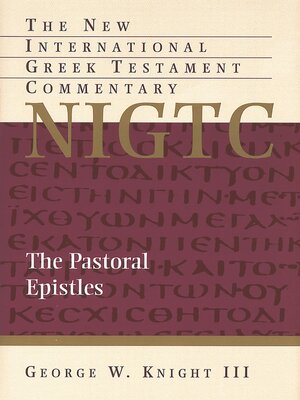The Pastoral Epistles
ebook ∣ New International Greek Testament Commentary (NIGTC)
By George W. Knight

Sign up to save your library
With an OverDrive account, you can save your favorite libraries for at-a-glance information about availability. Find out more about OverDrive accounts.
Find this title in Libby, the library reading app by OverDrive.



Search for a digital library with this title
Title found at these libraries:
| Library Name | Distance |
|---|---|
| Loading... |
This is a thorough, full- scale English commentary on the Greek text of 1 and 2 Timothy and Titus. While author George W. Knight gives careful attention to the comments of previous interpreters of the text, both ancient and modern, his emphasis is on exegesis of the Greek text itself and on the flow of the argument in each of these three epistles. Besides providing a detailed look at the meanings and interrelationships of the Greek words as they appear in each context, Knight's commentary includes an introduction that treats at length the question of authorship (he argues for Pauline authorship and proposes, on the basis of stylistic features, that Luke might have been the amanuensis for the Pastoral Epistles), the historical background of these letters, and the personalities and circumstances of the recipients. Knight also provides two special excursuses: the first gathers together the information in the Pastorals and elsewhere in the New Testament on early church offices and leaders; the other excursus examines the motivations for conduct in Titus 2:1-10 with a view to their applicability to present-day situations.







